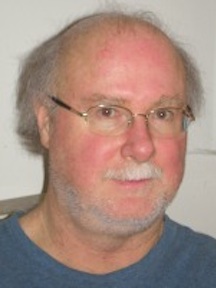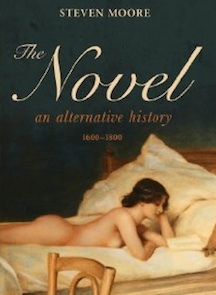
By Karys Blakemore
Steven Moore’s The Novel: An Alternative History, 1600-1800, (Bloomsbury, 2013) is the 2014 recipient of the Christian Gauss Award. This award recognizes literary works that “have a predominantly critical emphasis,” and promote literary scholarship.
Moore is a well-known editor, writer, and literary historian. Originally from Los Angeles, he earned both his B.A. and M.A. from the University of Northern Colorado and later obtained a Ph.D. from Rutgers University in 1988. From 1988 to 1996, Moore worked at Dalkey Archive Press and The Review of Contemporary Fiction, eventually becoming managing editor and helping to publish the works of talented writers such as David Markson, Alexander Theroux, and David Foster Wallace.
Moore first got the idea to compose a history of the novel while working at Dalkey Archive Press. In an interview with Music & Literature, he stated that he “unwittingly planted the seeds for [his] book,” after writing a short promotional piece in 1993. Furthermore, Moore realized during his time as a critic and editor that the majority of literary historians ignored centuries of literature in their examinations of the novel and that “a fundamental misassumption about the purpose of fiction was at the heart of the problem.” Thus, in 2004 Moore began to write a new history of the novel that would be much more intriguing, profound, and comical.
The Novel: An Alternative History, 1600-1800 is the incredibly entertaining second volume of this unorthodox examination of the history of the novel. The first volume, entitled The Novel: An Alternative History, Beginnings to 1600 (2010), explores the earliest novels, many of which were produced in great civilizations such as ancient Rome, Greece and Egypt. The second volume, however, concentrates on the novels produced during the 17th through 19th centuries. This in-depth examination of one specific time period helps the reader to understand why these centuries were so progressive and influential in shaping modern literature. Moore begins his discussion, for example, with an analysis Don Quixote, arguably one of the most significant novels of all time. He then explains the influence of Spanish literature such as Don Quixote on the European novels produced after 1600. Thus, Moore constantly creates connections between the novels of many different cultures and nations in a simple and thought-provoking way.
Those interested in reading The Novel: An Alternative History, 1600-1800 are guaranteed to enjoy its perusal of literary history for a multitude of reasons. During Moore’s discussion, he weaves together references to other 400 novels so that the reader might obtain a broader understanding of literature. More importantly, perhaps, is Moore’s use of humor and asides in creating an interesting read. When asked about the humorous nature of the book, Moore simply said, “I decided at the beginning it would be more fun—fun for me, and I hope fun for the reader-to write this in a casual, personal manner rather than in the formal, impersonal tone of an academic treatise.”
Selected Book Reviews
Review: The Novel: An Alternative History, 1600-1800
Reviewed by Jeff Bursey for Music and Literature
Review: The Novel: An Alternative History, 1600-1800
Reviewed by Roger Boylan for Boston Review
Review: The Novel: An Alternative History, 1600-1800
Reviewed by Publishers Weekly
The Christian Gauss Award has been offered annually since 1950. Established in honor of the Christian Gauss, the distinguished Princeton scholar, dean, and teacher, this award encourages authors in the field of literary scholarship or criticism.
For more information on this award and its winners, please visit the Phi Beta Kappa website.
Karys Blakemore is currently a senior at George Mason University majoring in Russian and Eurasian Studies and Spanish as a foreign language. She became a member of Phi Beta Kappa in her junior year. George Mason is home to the Omicron of Virginia Chapter of Phi Beta Kappa.




